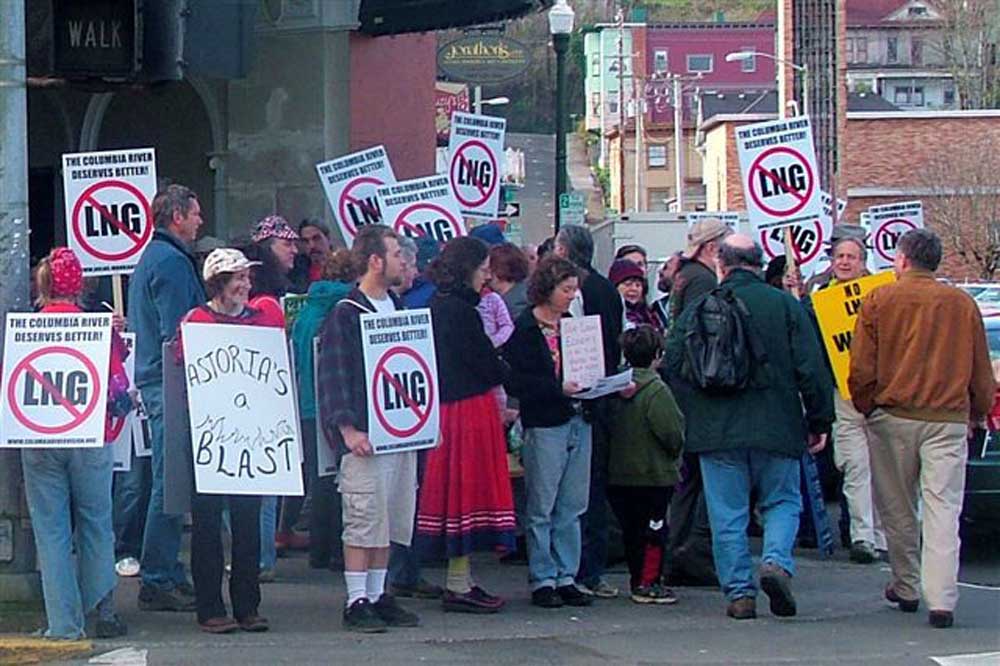Oregon LNG withdraws Warrenton project
Published 6:19 am Monday, April 18, 2016

- An LNG protest rally in Astoria in March 2006.
WARRENTON — After a decade of fighting Oregon LNG’s push to build a $6 billion terminal and pipeline project on the Skipanon Peninsula, Cheryl Johnson had no idea if an end was in sight.
“I hoped that I would see it in my lifetime, but I didn’t know,” said Johnson, the 65-year-old co-chairwoman of Columbia Pacific Common Sense.
The fight came to an abrupt end Friday, when Oregon LNG informed city and state officials that the company will withdraw the proposed liquefied natural gas development.
The move ended a long period of acrimony over a controversial project that galvanized residents to protect the Columbia River and caused political upheaval in Clatsop County.
Warrenton Mayor Mark Kujala said he was told by a company representative that Leucadia National Corp., the New York-based holding company behind the project, was no longer willing to bankroll the effort.
Skip Urling, the city’s community development director, said he was told Oregon LNG would not proceed with an appeal of a city hearings officer’s decision to deny the terminal. The hearings officer had approved the pipeline portion of the project.
A hearing on Oregon LNG’s appeal was scheduled before the City Commission for early May. But Urling said he was informed that “they’re done. They’re not going to fight the hearings officer’s position.”
Richard Glick, a Portland attorney representing the company, advised the state Department of Environmental Quality in an email Friday afternoon that the company is “ceasing development of its terminal and pipeline projects.”
Oregon LNG could not be reached for comment.
“This is not an act of God,” Laurie Caplan, co-chairwoman of Columbia Pacific Common Sense, said. “This happened because hundreds and hundreds and hundreds of people refused to have this project foisted on us.”
Brett VandenHeuvel, the executive director of Columbia Riverkeeper, a Hood River-based environmental group that led the opposition, called Oregon LNG’s retreat a “huge victory after 10 years of incredible local activism.”
“Farmers and fishermen and estuary residents should be very proud of their success,” he said. “It’s been inspiring to me and many others across the Northwest.”
Asked whether local activism or financial considerations had more to do with Oregon LNG’s defeat, VandenHeuvel said both factors came into play.
“The project would’ve been built seven years ago without local activists standing up,” he said. “(Oregon LNG) had local approvals. They were marching forward, and people challenged those approvals. There (were) lawsuits. There was a change in the (county) commission. All of those things led to the demise.”
“Financially, it doesn’t make sense if you can’t make progress in 10 years,” he continued. “But the reason for those 10 years was local opposition.”
Not everyone is happy.
Though fewer people turned out to support the project than came to oppose it at public meetings, supporters were vocal about the need to bring industry to the county and are disappointed that Oregon LNG’s attempt came to naught.
“I think it’s a disaster for Clatsop County, for the city of Warrenton, for all the taxing groups that work countywide,” Dick Hellberg, a former Warrenton city commissioner, said.
The staff at Columbia Riverkeeper, he said, “don’t have any understanding of the history or the needs of the people in Clatsop County, other than the retired segment that didn’t want anything to change. So they’re the winner, but, in the long term, the economy of Clatsop County is the loser.
“And all those people that are working on minimum wages and having to be supported by the food bank — they’re the losers, because we don’t have that many good-paying jobs or the tax base to do the things that we need to do in the county,” he said.
U.S. Sen. Ron Wyden, D-Oregon, said he was relieved that opponents of the project, who had raised environmental and safety concerns about industrial development at the mouth of the Columbia River, had prevailed.
“Local officials and members of the Clatsop County community raised valid concerns about this project from the very beginning,” Wyden said in a statement. “I shared the concerns that the Oregon LNG project would have had negative environmental and economic impacts, and I am relieved that local voices prevailed.”
Oregon LNG had proposed a terminal on the Skipanon Peninsula and an 87-mile pipeline to link with a natural gas connector in Washington state. The company wanted to export natural gas from western Canada and the Rocky Mountains to markets in Asia.
The company had argued that the project would be an economic boon for Warrenton and Clatsop County, providing jobs, as well as tax revenue to local governments.
But a coalition of residents, environmentalists and fishermen attacked the project as misguided and potentially dangerous. Activists had previously fought an LNG project at Bradwood Landing east of Astoria, which collapsed in 2010 after hitting financial and political roadblocks.
A draft environmental review of the Oregon LNG project by the Federal Energy Regulatory Commission released in August found that environmental impacts could be reduced if the company took measures to minimize harm to fish and wildlife habitat and water quality. A final review was expected in June.
Yet the project was facing a host of obstacles.
Last year, the state Land Use Board of Appeals upheld Clatsop County’s 2013 decision to deny a permit for a portion of the pipeline. The county’s Board of Commissioners had initially approved the pipeline in 2010, but the vote was reversed when new commissioners were elected after a political backlash.
Oregon LNG was embroiled in a lawsuit with the U.S. Army Corps of Engineers over an easement the Army Corps holds on the Skipanon Peninsula, where the company was leasing land from the Port of Astoria for the terminal.
And the split decision from the city’s hearings officer in March raised significant doubts about whether the terminal could move forward. The hearings officer found that the terminal would adversely impact fish habitat and fishing activity in the Lower Columbia River Estuary.
“Large fossil fuel export projects on the Columbia are doomed. They’ve repeatedly failed, from coal to oil to gas,” VandenHeuvel said. “People value the river for salmon and recreation and jobs that don’t destroy the river. So I think there’s a very bleak future for these giant export terminals.”
U.S. Rep. Suzanne Bonamici, D-Oregon, said the proposed LNG terminal was “not right for this community.”
“I join the many Clatsop County residents who are relieved to learn that it will not move forward,” Bonamici said in a statement. “I welcome productive conversations with Clatsop County leaders and residents about sustainable and safe ways to grow the region’s economy that capitalize on the region’s many strengths and create family wage jobs.”
Oregon LNG’s withdrawal spares the Warrenton City Commission from having to weigh in publicly on an issue that has drawn bitter opposition on the North Coast. The Astoria City Council voted in September to oppose the project. Public opinion was likely more balanced in Warrenton, where the project could have had a more direct economic benefit, but commissioners were facing difficult votes on the company’s appeal.
Oregon LNG publicly downplayed the importance of local approvals for the project, while at the same time seeking local permits to help satisfy multiple layers of regulatory requirements.
“Why would you apply to a city and contest that the city even had jurisdiction in the first place?” City Commissioner Henry Balensifer said.
Warrenton has welcomed big box stores and other business development, but Balensifer said the experience with Oregon LNG might prompt city commissioners to look more closely at land-use laws.
“There are things that we need to ensure so that we can actually plan and strategize what it is exactly that our community wants and what exactly is appropriate for our community to have in terms of industrial development on our waterfront,” he said.
Energy investors had been pursuing two separate liquefied natural gas projects on the Oregon Coast in a race to seize on a potentially lucrative export market.
The Federal Energy Regulatory Commission in March denied applications for the Jordan Cove terminal and pipeline project at Coos Bay, finding that investors had not identified markets and that the public benefits of the pipeline did not outweigh the adverse effects on landowners.
Veresen Inc., based in Canada, and The Williams Companies in Oklahoma, are appealing the decision, citing new commitments from buyers in Asia. Colorado Gov. John Hickenlooper, a Democrat, has also urged the federal agency to reconsider.
Jordan Cove was further along in the regulatory process than Oregon LNG and did not attract the same intense degree of local opposition.
Awash in astonishment and relief, Johnson, Caplan and a small group of Oregon LNG opponents met for Mexican food and beer at Plaza Jalisco in Astoria a few hours after the news broke Friday.
The partners-in-protest swapped stories about anti-LNG demonstrations going back to 2004, relishing that the story finally culminated in what they believe is a happy ending.
“It is long overdue,” Caplan said after learning of the company’s departure. “Oregon LNG has drained energy, resources, time and talent out of Clatsop County for way too long.”
Reflecting on their relentless effort to repel the project, the activists wondered why they had to spend a decade of their lives defending their coastal community in the first place. And, for all they knew, the fight could have continued for years.
“I knew we would win, because we were right,” Caplan said. “I just didn’t know when.”





